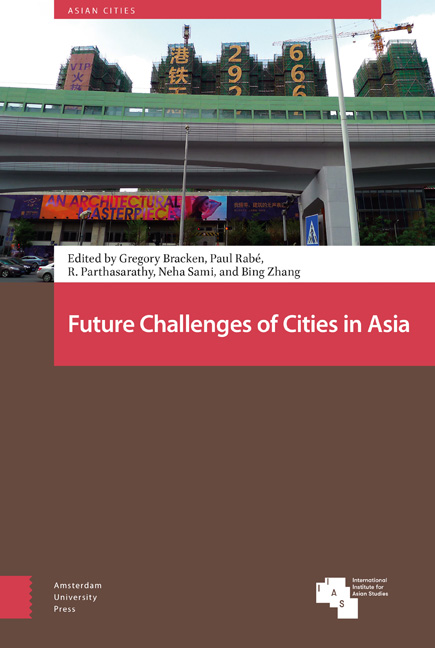Book contents
- Frontmatter
- About the Three UKNA Volumes
- Contents
- List of Figures and Tables
- 1 Future Challenges of Cities in Asia: An Introduction
- 2 Human Agency in the Asian City
- 3 Toward Inclusive, Vital and Livable City Scenarios: The Transformation of Urban Villages in Shenzhen
- 4 Cultural Dilemma in Beijing's Urban Regeneration: From Liulichang Cultural Street to Qianmen Street and Yangmeizhu Oblique Street
- 5 Housing as Heritage: The Great Urban Dilemma of the Global City of Shanghai
- 6 Not an Act of God: Lessons from a Disaster in the Settlements Planning of a River City
- 7 The Political Ecology of Climate Injustice in Bangkok
- 8 Assessing Flood-Related Vulnerability of the Urban Poor
- 9 The Ecological Future of Cities: Evaluating the Role of Green Infrastructure in Promoting Sustainability/Resilience in India
- 10 Hong Kong's “Rail-plus-Property” Development: A Model for Financing Public Transportation in Developing Cities in Southeast Asia?
- 11 Large Infrastructure Projects: The Emergence of Corridors in Asia
- Index
- Publications / Asian Cities
7 - The Political Ecology of Climate Injustice in Bangkok
Published online by Cambridge University Press: 21 November 2020
- Frontmatter
- About the Three UKNA Volumes
- Contents
- List of Figures and Tables
- 1 Future Challenges of Cities in Asia: An Introduction
- 2 Human Agency in the Asian City
- 3 Toward Inclusive, Vital and Livable City Scenarios: The Transformation of Urban Villages in Shenzhen
- 4 Cultural Dilemma in Beijing's Urban Regeneration: From Liulichang Cultural Street to Qianmen Street and Yangmeizhu Oblique Street
- 5 Housing as Heritage: The Great Urban Dilemma of the Global City of Shanghai
- 6 Not an Act of God: Lessons from a Disaster in the Settlements Planning of a River City
- 7 The Political Ecology of Climate Injustice in Bangkok
- 8 Assessing Flood-Related Vulnerability of the Urban Poor
- 9 The Ecological Future of Cities: Evaluating the Role of Green Infrastructure in Promoting Sustainability/Resilience in India
- 10 Hong Kong's “Rail-plus-Property” Development: A Model for Financing Public Transportation in Developing Cities in Southeast Asia?
- 11 Large Infrastructure Projects: The Emergence of Corridors in Asia
- Index
- Publications / Asian Cities
Summary
Abstract
This chapter addresses a gap in the literature on climate justice by examining inequity at the urban scale. Such a perspective builds on the concept of a climate-just city, which prioritizes the needs of those most vulnerable to climate change. This study focuses on Bangkok, a city not only highly vulnerable to climate change, but a city with one of the highest carbon emissions per capita. The chapter highlights instances of urban climate injustice by presenting three case studies: Bangkok's public transportation sector, the state's response to the 2011 floods, and coastal erosion in southern Bangkok. The cases show that the city's governance of climate change has unjustly benefited the upper echelon of society, while low-income communities have been adversely affected.
Keywords: urban climate justice, Bangkok climate change policy, 2011 Thailand floods, Bangkok urban governance, urban political ecology
Introduction
In June 2015, a group of civil society organizations (CSOs) from a number of Asian countries issued the People's Declaration for Climate Justice. The declaration asserted:
The burning of fossil fuels by big polluters has been found to be primarily responsible for emitting large amounts of greenhouse gases. We refuse to accept the “new normal’ and demand for climate justice by holding the big polluters and their respective governments to account for their contribution to the climate crisis. (Greenpeace 2015)
The polluters highlighted here are from the Global North. Climate Justice Now, an international network of CSOs, further asserting the links with the North, demanded “huge financial transfers from North to South based on historical responsibility and ecological debt” (Bond 2008). The focus of these quotations characterize much of the discourse on climate justice (see also Brown 2008; Posner and Sunstein 2008; Asian-Pacific Resource & Research Centre for Women 2009), which is primarily focused on justice on an international scale. During recent years, there has been an increased, if still limited, focus by both civil society and academics on climate justice at the national scale. However, despite a number of scholars, activists, and policy makers being in agreement that urban governance significantly shapes responses to climate change, only a few academics have written about urban climate justice (MacCallum et al. 2011; Steele et al. 2012; Hillier et al. 2013; Bulkeley, Edwards, and Fuller 2014).
- Type
- Chapter
- Information
- Future Challenges of Cities in Asia , pp. 155 - 182Publisher: Amsterdam University PressPrint publication year: 2019



